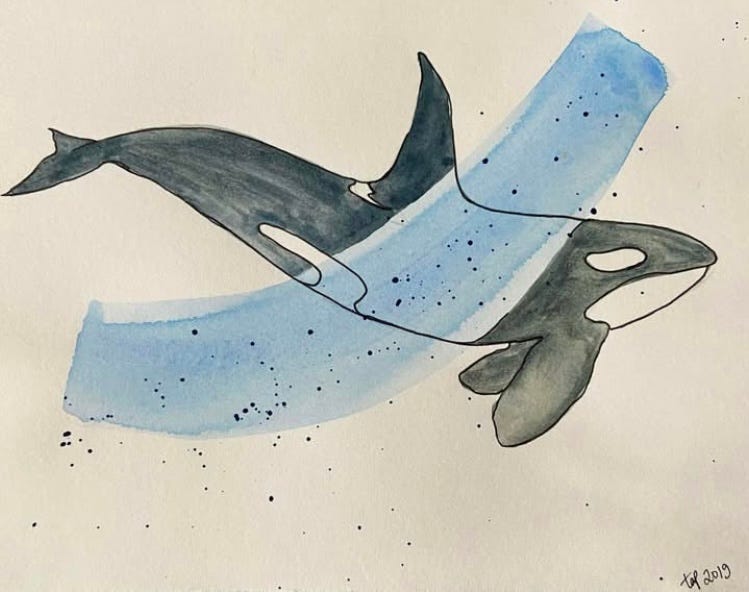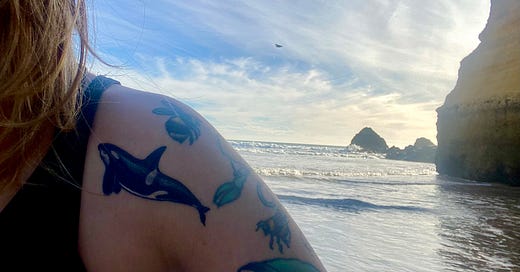I’m tightening the staysail in the moonlight, just as the boat heels with a powerful gust. I can see the bow splash into the tough of the swells, white foam bursting to the side and a bit of wash over the deck. The boat rights itself and we carry on south, more calmly. Two more turns of the winch handle. We pick up a knot.
It’s the last night of our Biscay crossing and I’ve come to understand how easily some sailing lore came along. Your eyes and ears can easily be tricked at sea. I hear voices, chanting in the wind. A mermaid’s song, perhaps? The water dances and takes shapes as whitecaps and reflected moonlight flicker. Small waves and little splashes can sound like the breath of large animals, like whales. I’m always keeping a weather eye out for them. Orca whales are the “sea monsters” of our time.
Some Orca have broken rudders off of sailboats around the Straight of Gibraltar and the Bay of Biscay. It’s wildly entertaining news despite the event being statistically rare—it’s rare enough just to see them, never mind have any kind of interaction.
I’m not scared of Orca. I don’t like the way so many people talk about them and the possibility of these whales damaging my boat is extremely personal. Aside from the risk to life and limb, it reminds me of how I lost my faith (if one considers hippie spirituality a “faith”) and how I often wish I could get it back—the perfect rabbit hole of thoughts for a 3am-6am night watch.

I had more than one existential crisis by my early 20s, at which point I struggled to believe in anything I couldn’t see or touch. Sometimes, I miss the security and comfort of believing in a benevolent universe, some omnipresent life force that is looking out for me, and that no matter what happens, I’ll be ok in the end. Starring out at the darkness, I accept that in some situations, I will not be ok. In some situations, I am just an animal like all others; human exceptionalism is meaningless. Orca could break off the rudder of my boat, and in the worst-case scenario, sure, I could drown (statistically unlikely, and no, it’s never happened). I think of Val Plumwood, sometimes referred to as the Mother of Ecofeminism. She was attacked by an alligator, taken below the water for a death roll, and narrowly escaped with her life and several new scars. She said, in that moment, she realised she was just another animal. That’s all we are.
People say the Orca are “attacking” or “aggressive,” and one person even called them “monsters.” Just stab me in the heart, why don’t you? All these words are judgements we are not qualified to make and they come directly from the Western worldview of Man v Nature which is largely responsible for the poly-crisis. It angers me so much; it’s come up in my last three (or 4?) thesis papers. We don’t know why Orca are breaking rudders. Some scientists hypothesise they are playing or like the feeling of the water. Neither of those things qualifies as an attack or makes them monsters.
Does it cause problems for us? Sure, but not a lot. It’s super rare considering how many vessels there are and the odds of even seeing Orca. I know one person in this rare group: he was delivering a sailboat and Orca broke its rudder, and even he doesn’t demonize the whales. He’s crossed Biscay about 40 times, seen Orca only three times, and that incident was only once. He doesn’t know why they do it, but you’re always close enough to land for a reasonable rescue if things get really bad. Then you repair the rudder and, yes, it will be expensive depending on your boat. But this is such a minor issue compared to other safety risks at sea, nearly all of which are more likely.
Yes, it could happen to me and my boat. No, I will not do anything that could harm an Orca. The most painful part of this conversation is the ten-year-old in me wants to scream that these whales and I have a connection; that I called to them with my mind and they came to the little boat I was on and swam so close I almost touched a dorsal fin. I have recurring dreams of Orca on a regular basis, and the ten-year-old in me wants to say that Orca are like a guardian angel or the ‘universe’ protecting me—that Orca can feel my presence and they care about me as much as I care about them.
So I cling to things we don’t know. We are constantly learning more about animal intelligence and their emotional lives, communication, navigation, social structures, etc. Animals are constantly surprising us—even plants surprise us! The whole forest root-mycelium network was big news. (In all fairness, Indigenous People have been saying this stuff for years, Western science is only catching up to much of their knowledge.) Ecosystems are life support systems. Life supports life.
My love for Orca runs deep, fuelled not just by their majesty, but my own fascination with their social lives: living in family pods, they follow the lead of a mother. Different Orca around the world have their own preferred prey and hunting strategies that they teach their young. They have language and culture. Some play with their food, some play with rudders. All play with each other.
Did you know that the Southern Resident Orca of the Pacific Northwest rub against the smooth pebbles covering the seabed of certain coves?
I don’t know if it was the ten-year-old me or the adult me that got an Orca tattoo before crossing Biscay. Surely it’s both parts of myself. The ten-year-old says it’s a symbol of protection. The adult me knows it’s deeper than that. Orca are special to me for countless reasons, not least of all having that encounter when I was ten. That day, I felt small. I felt small but connected to something bigger than myself. Despite my loss of spirituality, that feeling of connection isn’t gone. My adult self sees this little Orca tattoo as a reminder of my inner child; not the desire to believe in magic but the feeling of connectivity to the global ecosystem. I belong to the sea. That is a deep connection to life and life cycles I hope we all can feel, enjoy, and protect, regardless of or integrated with any belief system we may have.
The sun rises and my night watch thoughts turn toward the simple joy of being alive. I am a species on this planet, connected by an amazing web of food, oxygen, water cycles, flora and fauna and fungi, and more, to all other species. I have a role to play in the ecosystem, no matter where I am.
If you want to know more about the fight to save Southern Resident Orca, you can listen to my conversation with attorney Missy Lauren of the Earth Law Center and get the most recent updates on their website. There are plenty more great chats with amazing people around the world on this podcast, Coral Kelp & Community, available on my YouTube Channel and your favourite podcast platform.
Supporting Artist at Law via a paid subscription supports this substack, the future of this podcast, the sailing voyage, Tara’s artmaking, and all her other current and future endeavours to spread joy, inspire action, promote community, and otherwise create a world based on care, kindness, gratitude, solidarity, etc.





I love your love of the Orca. To my mind there is only one possible monster, and it has human form.